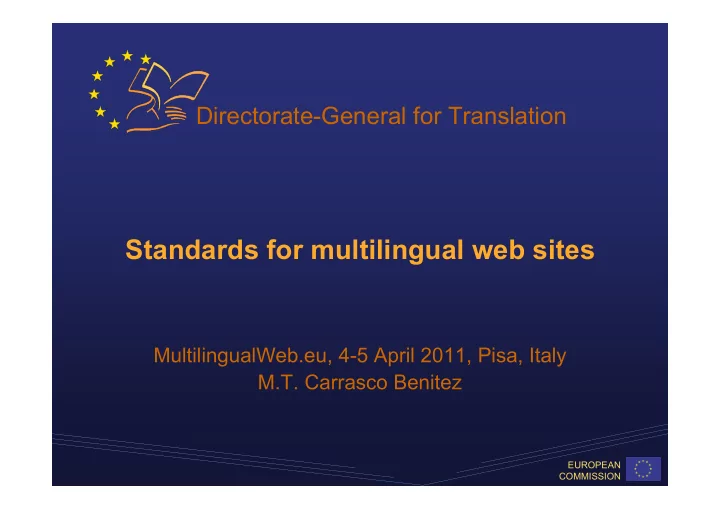

Directorate-General for Translation Standards for multilingual web sites MultilingualWeb.eu, 4-5 April 2011, Pisa, Italy M.T. Carrasco Benitez EUROPEAN COMMISSION
Multilingual Web Sites (MWS) Web sites with multilingual parallel texts • Texts that are translations of each other Most EU institutions are MWS • http://europa.eu Necessary for a real multilingual WWW Great practical relevance - 2 - MultilingualWeb.eu, Pisa 4-5 April 2011
Principles Break nothing • Forget about changes to the basic standards • Enter the dance without causing any missteps It will take a lot of work and time • To create the standards and programs - 3 - MultilingualWeb.eu, Pisa 4-5 April 2011
Two sides of the same coin User • Readers of web sites − Admittedly, users are often content contributors Webmaster • Builders of web sites − An idealised function that are in fact many functions This is a simplification • The real world is more fuzzy - 4 - MultilingualWeb.eu, Pisa 4-5 April 2011
Present situation User • No consistent multilingual user interface • User have different experience when visiting unrelated MWS; and even in the same web site − The user should always have the same experience in MWS Webmaster • Bespoke systems are built each time • It should be possible to built a new MWS with standard off-the-shelf software − Existing software are not interoperable − Each CMS keep the data in their way - 5 - MultilingualWeb.eu, Pisa 4-5 April 2011
Point of views User • Mostly monolingual or get a second-best language • Language selection is just hurdle • Like localization (L10N) Webmaster • Must manage a multilingual system • Building and maintaining systems with parallel texts is complex • Like internationalization (I18N) - 6 - MultilingualWeb.eu, Pisa 4-5 April 2011
Characteristics User • Grand public • A small additional complexity could be disastrous Webmaster • Professionals • A bit more adventurous, but not much - 7 - MultilingualWeb.eu, Pisa 4-5 April 2011
Interfaces User • Interface browser ↔ server • Standards: well established − Additional guidelines are needed Webmaster • Interface server ↔ content − Even the directory based content is not fully compatible • Standards: practically none - 8 - MultilingualWeb.eu, Pisa 4-5 April 2011
User 1 User interface - best practice guide Interface browser ↔ server Main functionalities • Get the best page • See other variants (linguistic versions) Implementations • Browser side • Server side - 9 - MultilingualWeb.eu, Pisa 4-5 April 2011
User 2 Browser side • Language button in the browser − Using HTTP header fields − Implementable with current specifications • Transparent Content Negotiation (TCN), cookies, etc − Very good, but little used – it might be too smart − Language is just one of the dimensions in TCN Server side • A reserved URI – http://example.com/mypage/ variant − This will show all the variants for the page “mypage” − Another approach is a federation of server a la Wikipedia http://de.wikipedia.org - http://fr.wikipedia.org - 10 - MultilingualWeb.eu, Pisa 4-5 April 2011
User 3 Translation request • As potentially available language – a variant − Immediately or referred − This will integrate machine translation Variants might have to be extended • Previous versions could be a variant dimension • Or a new metaresource concept would be required It should also be valid for wikis - 11 - MultilingualWeb.eu, Pisa 4-5 April 2011
Webmaster 1 New standards as they do not exist Interface server ↔ content • General requirement - not limited to MWS • Web server ↔ content management systems (CMS) Solve MWS and leave hooks for the others • Otherwise, it might take forever - 12 - MultilingualWeb.eu, Pisa 4-5 April 2011
Webmaster 2 Content ↔ content generation • Basic functionalities might be part of MWS − Page generation • A full translation system should be out of scope − Further interfaces or hooks The full framework • Authorship, Translation and Publishing Chain − ATP-chain Translation is expensive - 13 - MultilingualWeb.eu, Pisa 4-5 April 2011
Next step Create a new working group It should be in the I18N Activity of the W3C • What is the procedure? If the W3C is not interested • In an exiting one, such as the IETF • A dedicated initiative - 14 - MultilingualWeb.eu, Pisa 4-5 April 2011
To do list Two "standards" • Multilingual web best practice guide for user interface • Multilingual web best practice guide for content management Paper + running code • Reference development Implementing early mechanisms already in the standards and server side • Language button • Variant URI - 15 - MultilingualWeb.eu, Pisa 4-5 April 2011
End Interested parties have a look to MultilingualWebSites.org - 16 - MultilingualWeb.eu, Pisa 4-5 April 2011
Recommend
More recommend